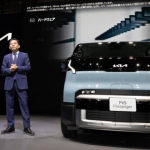BMW : The automotive industry is undergoing a major transformation, with electrification, autonomous driving, and advanced automatic transmissions reshaping the way cars are built and driven. Despite this shift, BMW has remained one of the few brands that continues to offer manual transmissions in its performance-oriented models.
But with stringent emission norms, declining demand, and evolving technology, the big question remains—how long will BMW continue to support the manual transmission? In this blog, we explore BMW’s approach, the reasons behind its commitment to manuals, and the challenges that could lead to their eventual disappearance.
Why Is BMW Still Offering Manual Transmissions?
While many carmakers have completely phased out manual gearboxes in favor of automatics and dual-clutch transmissions, BMW has taken a different approach. Here are the key reasons:
1. Driving Engagement & Purity
BMW has long been known for its “Ultimate Driving Machine” philosophy, and manual transmissions align perfectly with that vision. Enthusiasts argue that a manual gearbox provides:
✅ Better driver engagement – More control over gear changes
✅ A purist experience – A connection between the car and driver
✅ Better driving skills – A rewarding challenge for enthusiasts
2. Demand from Enthusiasts
Despite the decline in manual transmission sales, there is still a strong niche market for performance-oriented manual cars. BMW caters to this segment by offering manual options in M models like the M2, M3, and M4. These cars are often purchased by passionate drivers who prefer the feel of a traditional gearbox.
3. Brand Heritage & Tradition
BMW’s motorsport history is deeply connected with manual transmissions. Legendary models like the E30 M3, E46 M3, and E39 M5 all came with manuals, and BMW wants to keep that legacy alive.
BMW’s Current Manual Lineup: What’s Still Available?
Although BMW has reduced the number of manual models in its lineup, it still offers them in key performance cars:
🚗 BMW M2 (G87) – One of the last small performance cars with a manual option
🚗 BMW M3 & M4 (G80/G82) – The only sports sedans in their class with a manual transmission
🚗 BMW Z4 (Europe only) – A manual version of this roadster was introduced in select markets
🚗 Older M Models – Enthusiasts can still find used M cars with manuals, like the F80 M3 or F82 M4
However, entry-level BMW models like the 3 Series, 5 Series, and SUVs no longer offer manual gearboxes, signaling a shift towards automatic-only lineups.
Challenges to the Future of Manual Transmissions
Despite BMW’s efforts, several challenges threaten the existence of manual transmissions in the coming years:
1. Declining Consumer Demand
Automatic transmissions are no longer slow or unrefined. Today’s torque-converter automatics, dual-clutch gearboxes (DCTs), and CVTs are faster, smoother, and more fuel-efficient than manuals. As a result, most buyers prefer them over manuals.
2. Strict Emission Regulations
Governments worldwide are enforcing stricter CO2 and fuel efficiency regulations. Since manual transmissions often consume more fuel due to inconsistent driver inputs, manufacturers are focusing on automatics and hybrid powertrains to meet emissions targets.
3. Electrification & Hybridization
As BMW shifts towards electric and hybrid models, manual transmissions will become increasingly irrelevant. EVs don’t require multiple gears, as they use single-speed transmissions to deliver instant torque.
💡 Example: The BMW i4 M50 and upcoming BMW M EV models will have no manual transmission, indicating the inevitable decline of stick shifts.
4. Cost & Production Constraints
Developing and certifying manual transmissions requires additional engineering costs, especially when sales are minimal. Many automakers, including BMW, might find it financially unviable to continue offering manuals.
Will BMW Discontinue Manual Transmissions Completely?
While manual transmissions will likely disappear from mass-market BMW models, there is still hope for enthusiasts.
✅ BMW M Division’s Commitment – The M division has confirmed that manual M cars will remain available as long as there is demand.
✅ Special Editions & Collector Models – BMW could continue offering limited-run manual models, much like Porsche does with the 911.
✅ BMW Classic & Restomod Culture – Even if new BMWs lose manuals, older models will remain popular among enthusiasts and tuners.
However, once internal combustion engines (ICE) are phased out in favor of full electrification, manual transmissions will become a thing of the past.
Conclusion: How Long Will BMW Manuals Survive?
BMW’s decision to keep manual transmissions alive is a bold move, but the writing is on the wall—manuals are living on borrowed time. With the push for electrification, tighter regulations, and changing consumer preferences, manual transmissions are likely to fade out within the next decade.
That said, BMW M cars may be the last bastion of stick shifts, offering them until they are completely unsustainable. If you’re an enthusiast, now is the best time to buy a manual BMW before they vanish forever!
🚗 Would you choose a manual BMW over an automatic? Let us know in the comments!

Hello, my name is Muskan Kumari and I am an experienced Digital Marketer. I have been blogging for the last 3 years and I have special interest in SEO. Here I give you easy bikes and writes easy-to-understand reviews and news about the latest bikes, helping readers choose the best options.. My aim is to always provide you with accurate, new and useful information.










